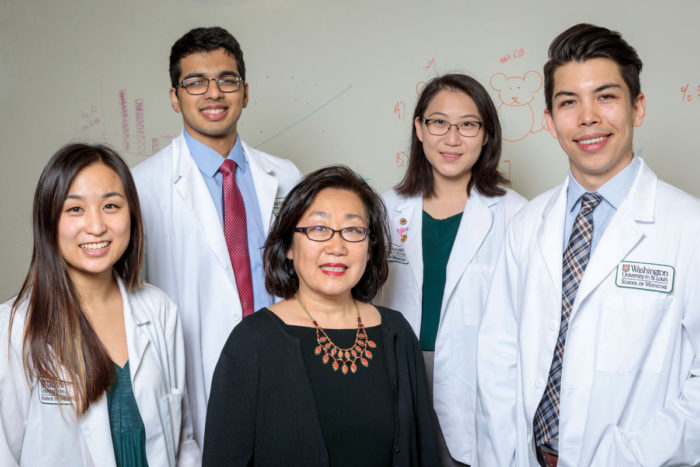4 medical students named Howard Hughes fellows
Award offers year of mentored research
 Matt Miller
Matt MillerFour students at Washington University School of Medicine in St. Louis have been selected to receive mentored training with top biomedical scientists through the Howard Hughes Medical Institute’s (HHMI) Medical Research Fellows Program. Recipients (from left) Margery Gang, Nakul Shah, Brooke Liang and Connor Liu are shown with Koong-Nah Chung, PhD, (center) the university’s associate dean for medical student research and director of the Office of Medical Student Research.
Four medical students at Washington University School of Medicine in St. Louis have been selected to receive mentored training with top biomedical scientists through the Howard Hughes Medical Institute’s (HHMI) Medical Research Fellows Program.
The program offers aspiring physicians and scientists $43,000 each in grant support, allowing students to spend a year conducting basic, transitional or applied biomedical research in the laboratory.
The School of Medicine’s recipients are Margery Gang, Brooke Liang, Connor Liu and Nakul Shah. Gang, Liang and Shah are among 52 students nationwide awarded the fellowship for the first time. Liu is one of 14 fellows to receive funding for a second year.
“Being selected as a HHMI medical student fellow is an exciting opportunity for these future physician-scientists,” said Koong-Nah Chung, PhD, the university’s associate dean for medical student research and director of the Office of Medical Student Research. “It is an enormous honor to be selected, and we wish them well as they perform cutting-edge research and gain new knowledge and perspectives that will give them invaluable experiences and useful tools for their future careers.”
Additionally, the four HHMI fellows will participate in the master’s degree program, which allows medical students to earn dual degrees. It is directed by Deborah C. Rubin, MD, a professor of internal medicine, of gastroenterology and of developmental biology.
To apply for the HHMI fellowship, students submitted proposals and named current mentors.
Gang’s project centers on the immune system’s response to cancer cells. She is analyzing “natural killer” cells that have the potential to recognize and ultimately destroy hematological malignancies.
“With the HHMI fellowship, I have the extraordinary opportunity to work in a lab that already has pioneered the first-in-human phase I clinical trial examining natural killer cell memory in cancer patients,” said Gang, a third-year medical student. “Our research is aimed at redefining future medical therapy for devastating diseases such as acute myeloid leukemia.”
Gang’s mentor is Todd Fehniger, MD, PhD, an associate professor of medicine.
Liang’s research focuses on potential therapies that will prevent maternal-fetal transmission of the mosquito-borne Zika virus. The virus can cause brain damage and death in pregnant women. Specifically, Liang and her research colleagues will examine how Zika may subvert the placenta — typically an excellent barrier against pathogens — through a cellular recycling pathway known as autophagy.
“My project will be to explore more deeply the relationship between Zika and autophagy, with a goal of developing a better understanding of placental defenses, which are extremely important but understudied,” said Liang, a third-year medical student who spent the past year devoted to research. “I also am interested in applying my research to potential therapies that will prevent the maternal-fetal transmission of Zika virus.”
Liang’s mentor is Indira Mysorekar, PhD, a professor of obstetrics and gynecology, and of pathology and immunology.
Shah’s research concentrates on cancer and its relationship to what is known as “junk DNA,” the transposable elements that comprise about half of the human genome. He will help analyze 33 cancer types to determine how often cancer cells may hijack transposable elements and contribute to tumor growth.
“What interests me about this topic is how this could be a double-edged sword for cancer cells,” said Shah, a third-year medical student. “On one end, cancer cells can use transposable elements to activate tumorigenic pathways; but on the other end, this may allow for the development of creative therapeutic strategies targeting the consequences of this phenomenon.”
Shah’s mentor is Ting Wang, PhD, an associate professor of genetics and of computer science and engineering.
Liu’s research centers on testing computational strategies that may be used to design therapeutic cancer vaccines to treat malignant brain tumors.
“This past year in the lab has been incredibly impactful on my desire to become a physician-scientist and has guided my trajectory toward pursuing additional scientific training,” said Liu, who will enter his third year as a medical student after the fellowship. “The HHMI fellowship has helped shape my understanding of what it takes to be a successful academic physician, as well as connected me with HHMI investigators and other medical students with similar professional goals. The ability to think like a scientist is a product of time spent in the laboratory, and I knew that an additional year would be critical to my basic science training.”
Liu’s mentor is Gavin P. Dunn, MD, PhD, an assistant professor of neurological surgery, and of pathology and immunology.
Altogether, the HHMI fellows represent 38 U.S. academic or nonprofit research institutions.
The HHMI fellows program is “a unique opportunity for students to explore the intersection of science and medicine firsthand in a rigorous and supportive environment,” said David J. Asai, the institute’s senior director of science education. “Our hope is that the experience will ignite students’ passion for research and encourage them to pursue careers as physician-scientists.”
The HHMI program has funded more than 1,800 students since it began in 1989.






